-
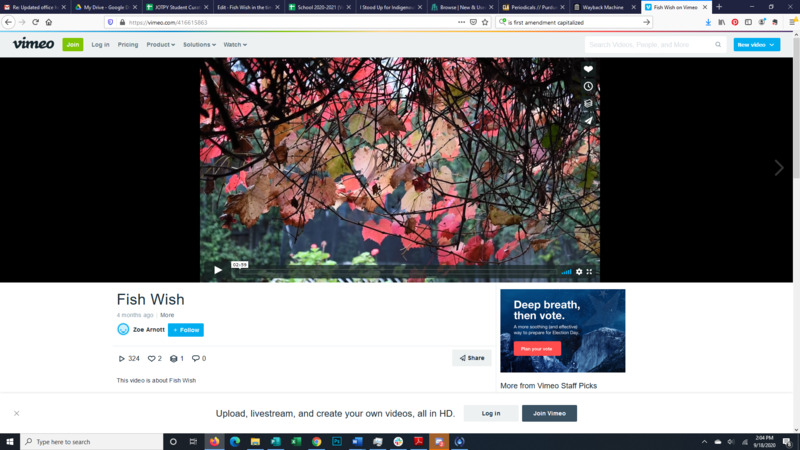
2020-05-04
We decided as a family to create a film that documented our experience of lockdown. The film is a narrative that is loosely based on our family's lived experience in the time of Covid-19. The act of making the film as a family served to connect us creatively. The film also acts as a time capsule.
-

2020
‘Grounded’ is a series of podcast interviews (created in the first three months of the pandemic) with aviation industry participants regarding the impacts and issues that the Covid-19 pandemic creates for the General Aviation industry in Australia. This is important because General Aviation is often forgotten about in the discourse. What is generally talked about in the media is the AIRLINES - not the small, family run General Aviation businesses and pilots). In these podcasts, I interview the smaller players in the industry - a small tourist charter operation manager, an airshow organiser, a flight school operator, the chairman of Recreational Aviation Australia, a light aircraft manufacturer, a maintenance facility operator, and even the editor of a general aviation aircraft trading magazine. All interview participants of the podcasts provide significant personal insights into the impacts of Covid-19 on their industry that are not generally part of mainstream media discussion. I have submitted this artefact as it provides a unique insight into the lesser-known parts of the aviation industry in those first three months of the pandemic.
-
2020-05-26
As schools closed, a more unique kind of panic that kept me up at night during those first few weeks, being the mother of a child with special needs.
-
2020-04-30
The absence of a physical shul community has reinforced my love of that community.
-
2020-05-11
Saying Shehecheyanu as a thanks to all that we regard precious in life
-
2020-04-05
Pesach 2020: This night that is different from all other nights is going to be even more different this year.
-
2020-03-24
As borders around the world were slamming shut, I organised for my daughter to return home from Israel very fast, experiencing the anxieties of my childhood overlaid with the stories of my parents .
-
2020-03-23
Article about celebrating a barmitzvah during the Covid19 restrictions
-
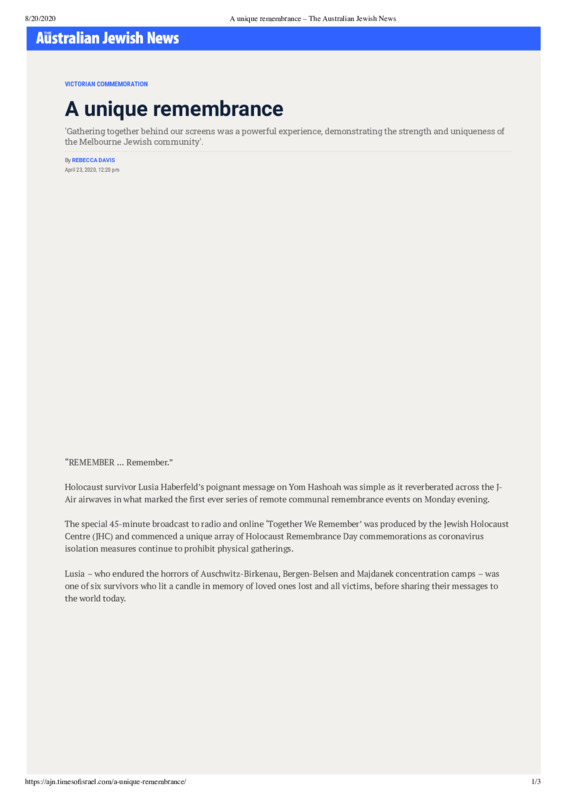
2020-04-23
This article, written by Rebecca Davis and published on 23 April 2020, reports on the Yom Hashoah events held the previous day, all online because of the lockdown.
Three events are reported on: "special 45-minute broadcast to radio and online ‘Together We Remember’ [which] was produced by the Jewish Holocaust Centre (JHC) and commenced a unique array of Holocaust Remembrance Day commemorations as coronavirus isolation measures continue to prohibit physical gatherings"; "Immediately following the J-Air broadcast, the interactive Zoom event ‘Turning Memory into Action’ was hosted by LaunchPad in partnership with the JHC"; and "Later in the evening, the Jewish Community Council of Victoria together with the JHC screened 13 survivor testimonies on YouTube."
-
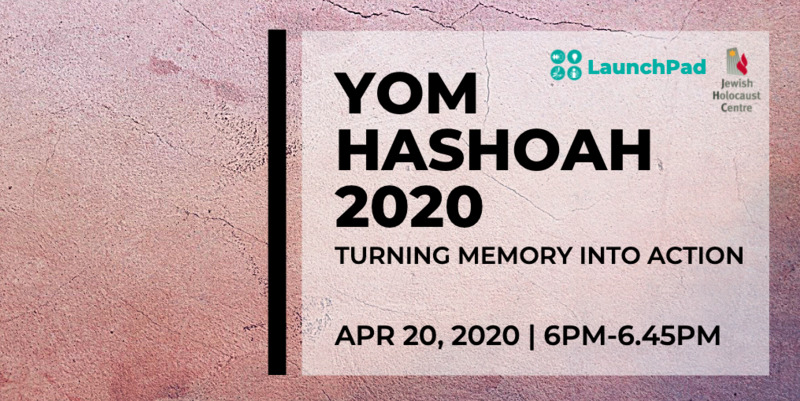
2020-04-20
Due to the pandemic, Yom Hashoah commemoration events, which would normally be held in person, needed to go online.
On April 20, 2020, LaunchPad hosted an online, zoom-based, Yom Hashoah event which "consisted of an intergenerational conversation exploring the preservation of memory and the ways in which we can each be custodians of our family's stories."
At the event there were three speakers: Phillip Maisel (Holocaust survivor), Suzy Zail (2nd Gen) and Julia Sussman (3rd Gen), moderated by Jennifer Levitt Maxwell.
The event (which went for 45 minutes) also involved candle lighting. Everyone was encouraged to light a candle at home, and then six people were nominated to light 6 candles for the event, namely: Pauline Rockman OAM - co-president of the Jewish Holocaust Centre, Simone Szalmuk-Singer - co-chair of Australian Jewish Funders, Phil and Sue Lewis and their family - co-chair of the Jewish Holocaust Centres capital campaign, Helen Mahemoff - Board Director of the Jewish Holocaust Centre, Arek dybel - filmmaker and creative director at museum POLIN in Warsaw, and Andrea Lipshutz - representing LaunchPad’s ‘Regeneration Melbourne’ Committee.
-
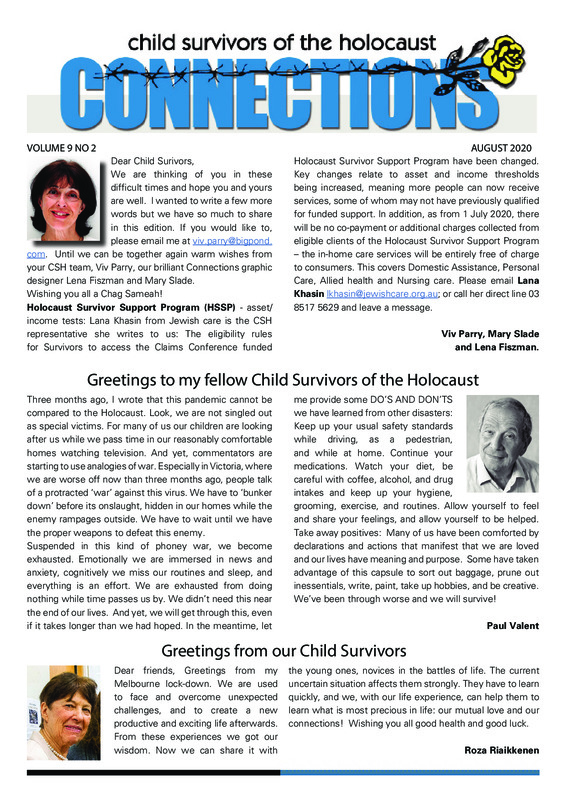
2020-08-19
This collection of writings was assembled by Viv Parry (Chairperson for the Child Survivors of the Holocaust Melbourne Group) for submission to the archive. It contains the following:
'A Point in Time', a recent article that Viv Parry was asked to write for the New Year Magazine for The Ark Synagogue, Hawthorn
Connections (August 2020) is a newsletter edited by Viv Parry for the Child Survivors of the Holocaust (CSH) Melbourne Group. In this newsletter there are 9 individual contributions from CSH in answer to her personal request to "tell us how you are travelling at the moment during this unprecedented time?" Viv made no suggestions, asking only that they addressed the group (265 CSH members) and shared their thoughts at whatever level they found personally relevant to themselves.
'Child Survivors, Corona' is an article written by Dr Paul Valant's for Connections, published in April 2020. A second article on the topic appears in the August edition of the newsletter.
An email from Stefanie Selzer, dated 31.7.2020. Stefanie is the World Federation Of Jewish Child Survivors of the Holocaust & Descendants N.Y, President and Claims Conference representative. Stefanie forwarded our Connections Newsletter to the other CSH groups in the US including Canada where Mark Elster felt compelled to reply (also included in the same document).
These documents together create a story of a unique group of people who are supporting each other at this difficult time, with a remarkably positive attitude.
-
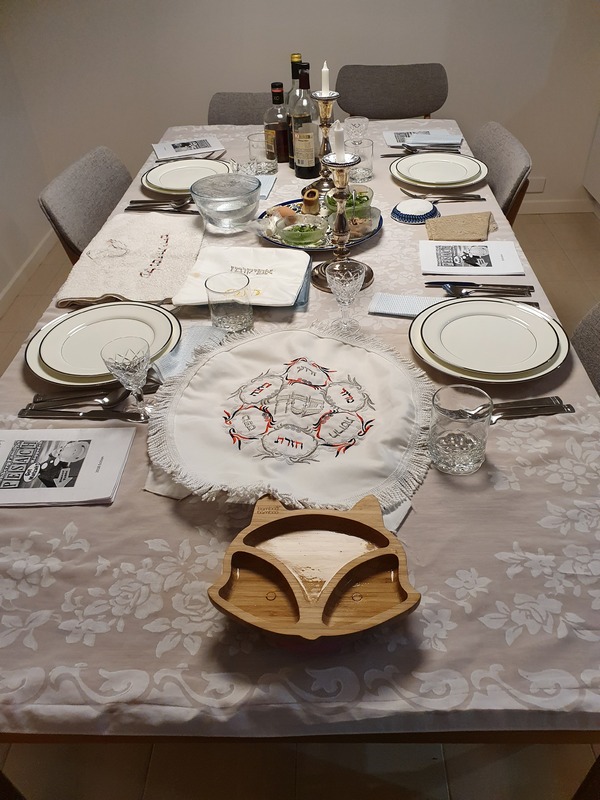
2020-04-08
Pesakh was going to be a large family event. We had people coming from London, Canberra, Sydney and of course, Melbourne. Then the pandemic hit. No-one could travel, and we were not allowed any visitors in our house. So, we set up a zoom Seyder. We had members of the family join Zoom from London, Lund (Sweden), Canberra, Sydney and Melbourne. It was a huge success.
-
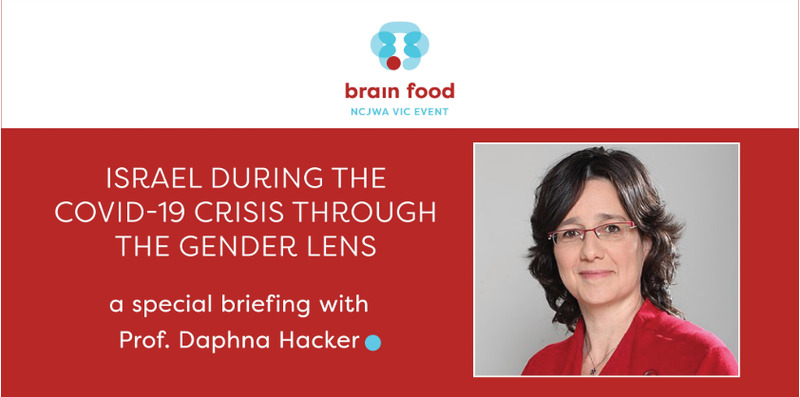
2020-04-01
The National Council of Jewish Women of Australia Victoria (NCJWA Vic) was established 93 years ago with the vision of creating a better world for women. Our mission, is to support women at key points across the life cycle, advance their status and promote social cohesion and human rights.
NCJWA Vic rolled into crisis management determined to continue our mission to support women and girls during this difficult time. Strong and decisive action was taken to keep our people safe and continue serving our community. We quickly adapted most of our program, while participants were incredibly grateful for our continued support, illuminating the need and value of social connection for mental wellbeing throughout our lives, even more so during such a crisis.
-

2020-03-01
Connect Is NCJWA Vic's set of programs for older women, encouraging social interaction while improving their mental and physical health. These programs create a sense of community and family while offering a place where older people come together, have a chat and relax. Our main programs are The Golden Age Clubs, for Russian speaking Jewish migrants from the former Soviet Union, and Seniors and Bridge clubs.
-
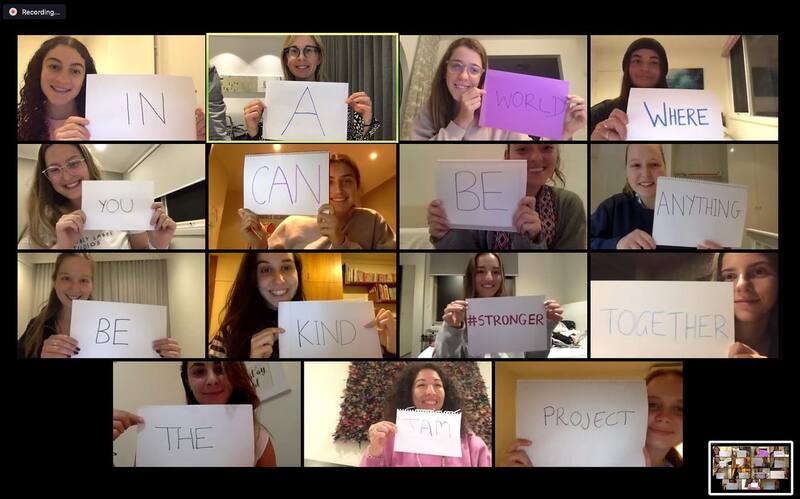
2020-03-01
The Jam Project is a teenage - buddy program matching participants aged 14-16 years with a female 'buddy' aged 21-28, with the goal of promoting the empowerment of girls, while helping to build their sense of self-worth, self-belief and autonomy. This is achieved through secure and reliable fortnightly catch ups, between the buddy and participant for up to a period of a year. Together with group sessions, the participants and buddies come together and are involved in activities that enhance their mindset and promote their curiosity, resilience and autonomy.
Due to COVID-19, NCJWA Vic took steps to adapt the Jam Project in this difficult time. Our priority is to maintain our objectives and values through these adaptations.
-
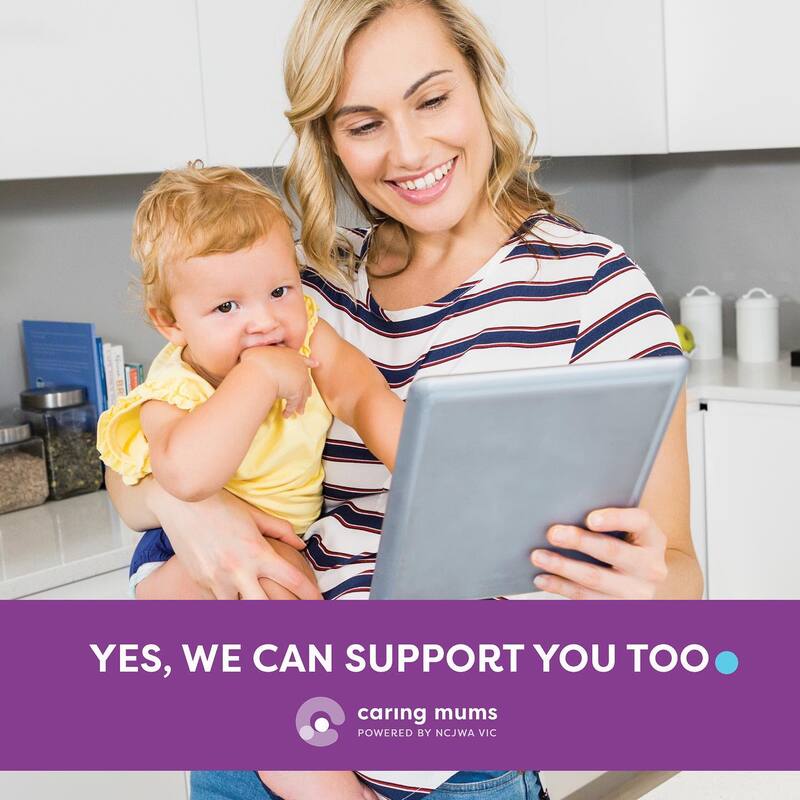
2020-04-01
The Caring Mums program is a service providing emotional support to mothers of babies and pregnant women. The program matches trained volunteers, all of whom are mothers themselves, to new mums with the goal of developing a secure trusting relationship. Through regular weekly meetings for up to a period of 12 months, mums’ feelings of isolation, anxiety and depression decrease, while their parenting confidence and sense of belonging grow significantly.
Caring Mums adapted its program so that its aims and values can still be upheld during the current pandemic. We continue to see mums in our current catchment whilst growing our service into new areas, using technology, as we understand the impact this reality has on vulnerable and isolated populations, including mums already facing many new challenges.
-
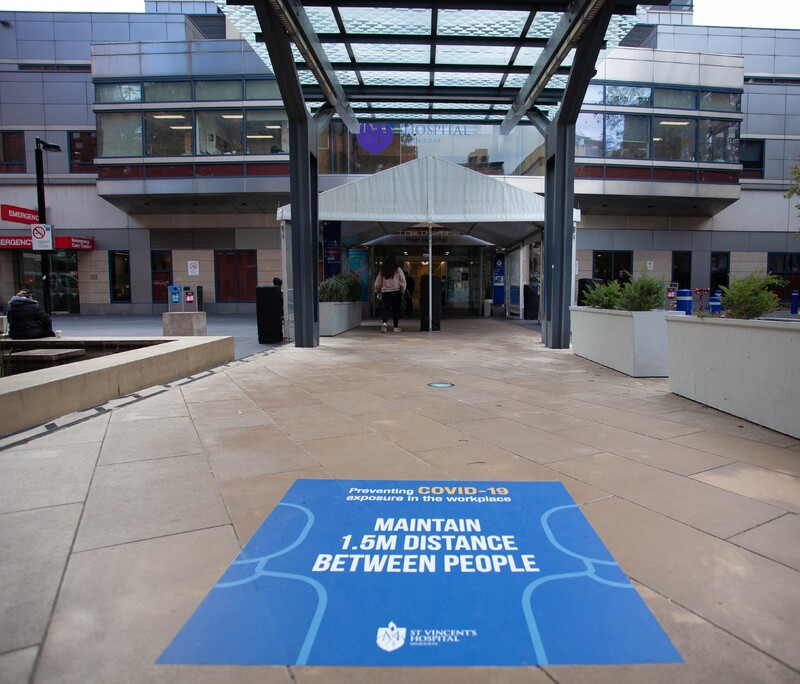
2020-07-14
This floor decal in the hospital forecourt was introduced in June 2020, one of many communications produced for both internal and external hospital audiences in response to the course of the pandemic and evolving government public health guidelines and restrictions.
-

2020-08-10
The pandemic has inspired a lot of creativity including street art. This example on a mail distribution box was spotted while walking in the local neighbourhood (walking being another popular pandemic past time). The design has a virus symbol together with a rat. ("The rat" is a colloquial term for Ballarat).
-
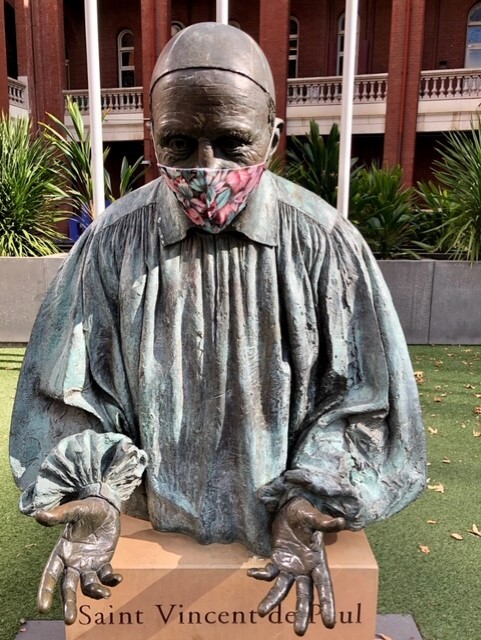
2020-08-11
St Vincent is the patron saint of St Vincent's Hospital Melbourne. This statue has been popular with visitors and staff, featured in many photos and selfies, located in a plaza area in front of the main inpatient facility which is a centre of gatherings and activity in normal times. A series of masks have been placed on St Vincent's face by staff to reinforce the message of the importance of this measure to limit the spread of the virus. The one pictured was one of many sewn by hospital volunteers in a project to provide masks for vulnerable community members.
-
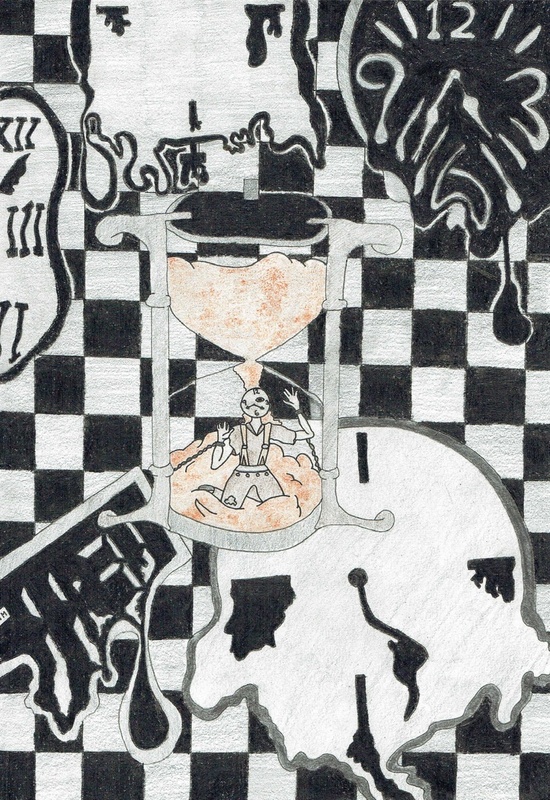
2020-07-30
Melting Through Time is a drawing by my 13 year old daughter who felt that this depicted how she feels being in lockdown stage 4. I feel that it is an accurate representation of how many people are feeling irrespective of age: trapped, powerless, confused and wondering how to find purpose and maintain their identity.
-
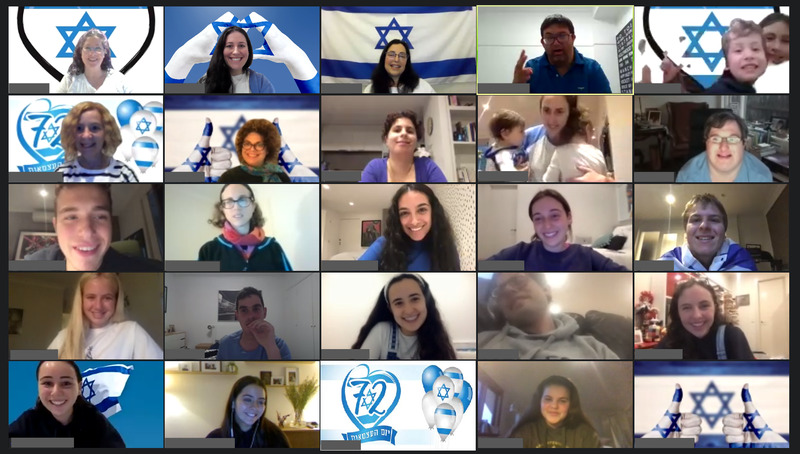
2020-03-16
Access Online refers to the suite of virtual programs created specially by Access in response to the 2020 Coronavirus (Covid-19) Pandemic.
These virtual programs are different to Access’ regular physical programming, however, they retain a link to our regular learning streams and are intended to provide participants with low intensity skill development, social connection and purposeful engagement.
The programs have also been carefully put together to ensure they remain committed to Access’ values and mission and suit these different times.
-
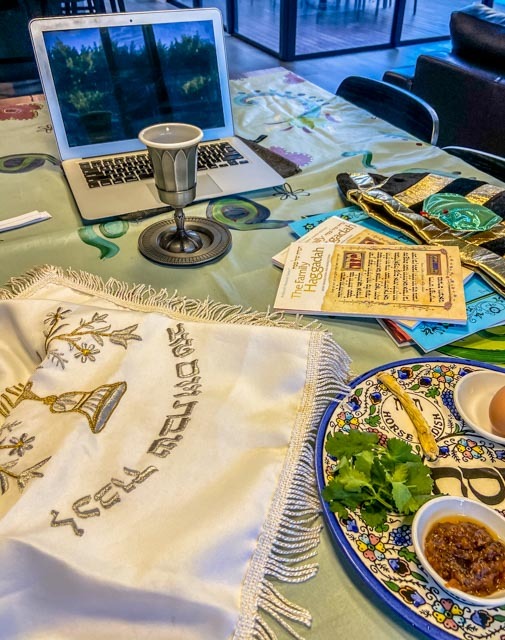
2020-04-05
First night seder of Pesach took place on zoom with ten different extended families from across the globe. Whilst it was chaos to the max, it was actually one of the most fun-filled interactive seders I have ever experienced.
-
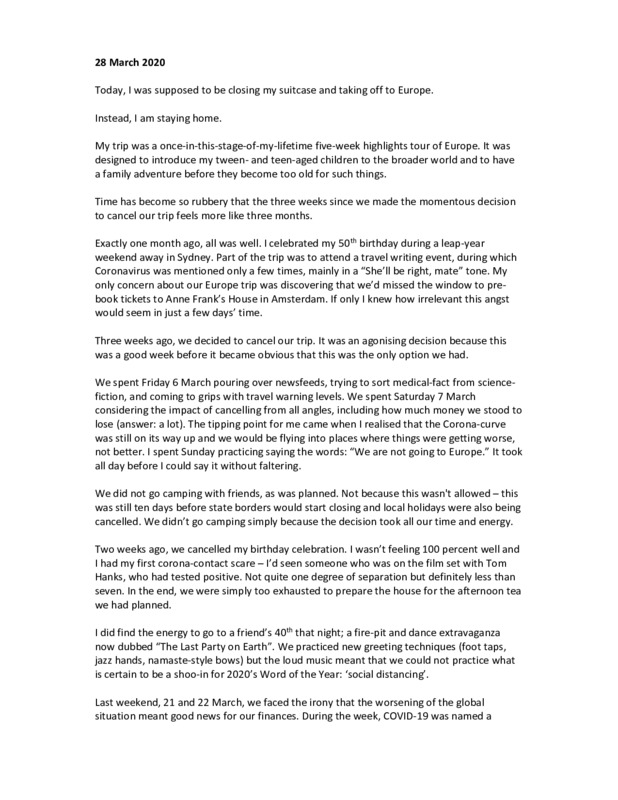
2020-02-28
I wrote this story for Womankind magazine's online 'Life in Lockdown' site. It is my reflection on my decision to cancel my long-planned overseas family adventure in the very early days of the pandemic. I wish I'd kept a better diary of this time so I'm glad I wrote this piece.
-
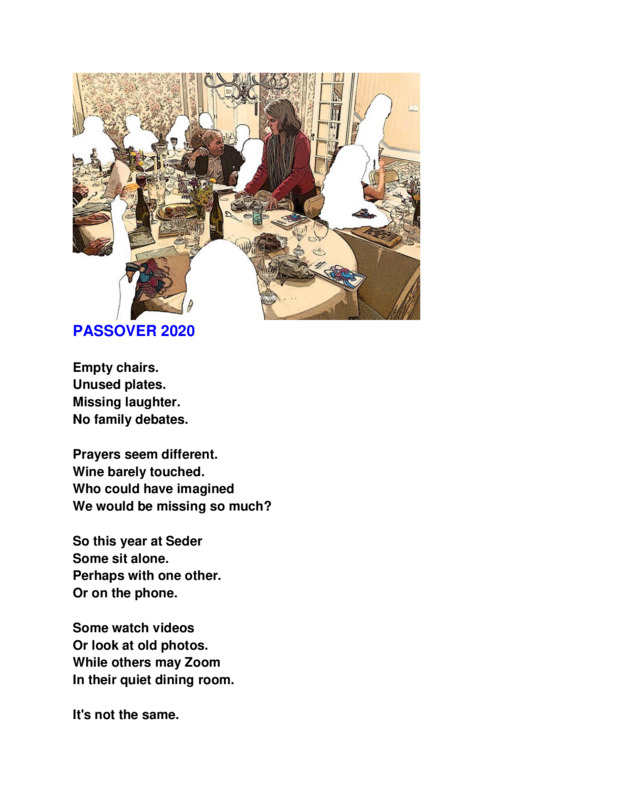
2020-04-07
Missing the Seder with friends...the story, songs, prayers, food and children squirming waiting for dinner.
-
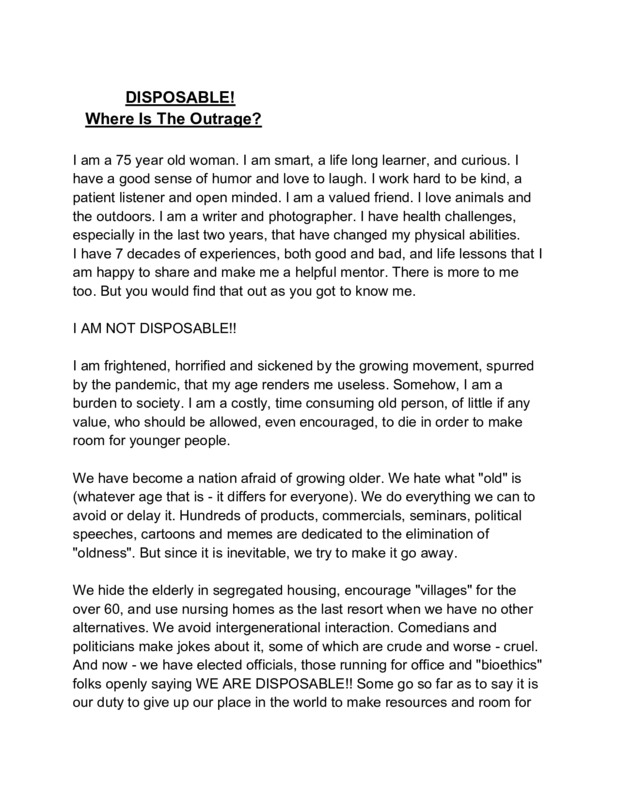
2020-06-09
Personal Reflection in regard to growing opinion that "it is the duty of the old to step aside and let younger people receive treatment",
-
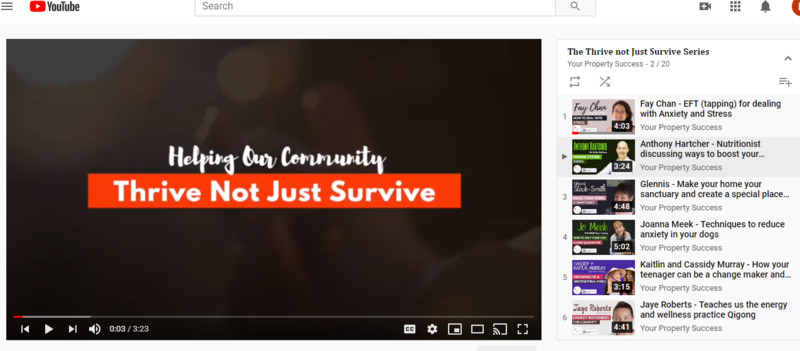
2020-04-03
In March 2020 when we in Australia were first told to head into lockdown stage 3, I realised that my community although initially bought together in our mutual interest in renovation and property investing were also now all in this time together and I could use my networks and platform to assist us all during this time. So instead of selling courses I concentrated on bringing together experts to assist my community. I also incentivised people in joining my community by encouraging them to donate to Kids Help Line (who needed resources desperately as they only could answer 40% of the 9000 calls they were getting a week) by giving them for free access to my Your Property Success Club (normally $695pa). I raised $10,000 in 14 days for KHL and helped my community through the initial confusion and stress of the shutdown. I have received so many messages about how these trainings helped and served and I am so grateful for the support of my friends, family and network who quickly responded and gave their time so I could interview them over the 3 week period that these 15 episodes were recorded.
-
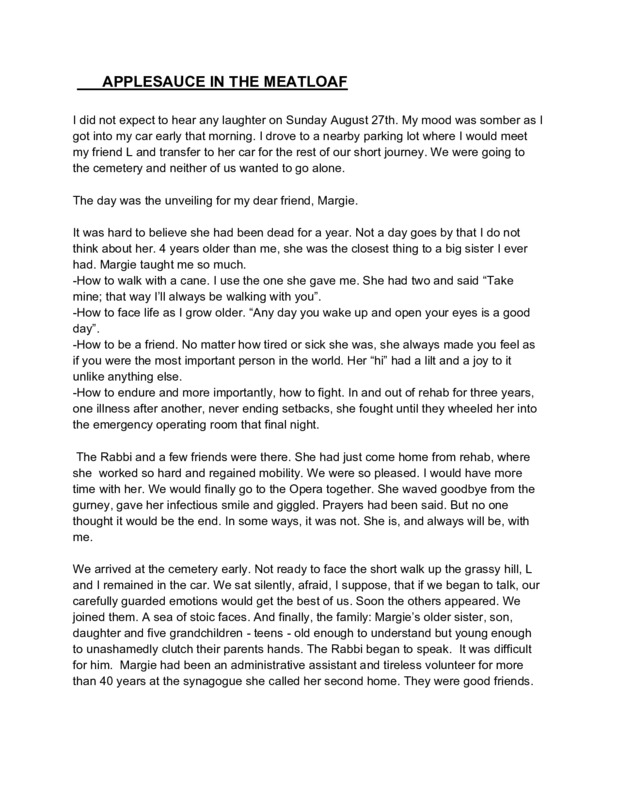
2018
An unveiling of a dear friend , an unexpected lesson learned, and the value of every day.
-
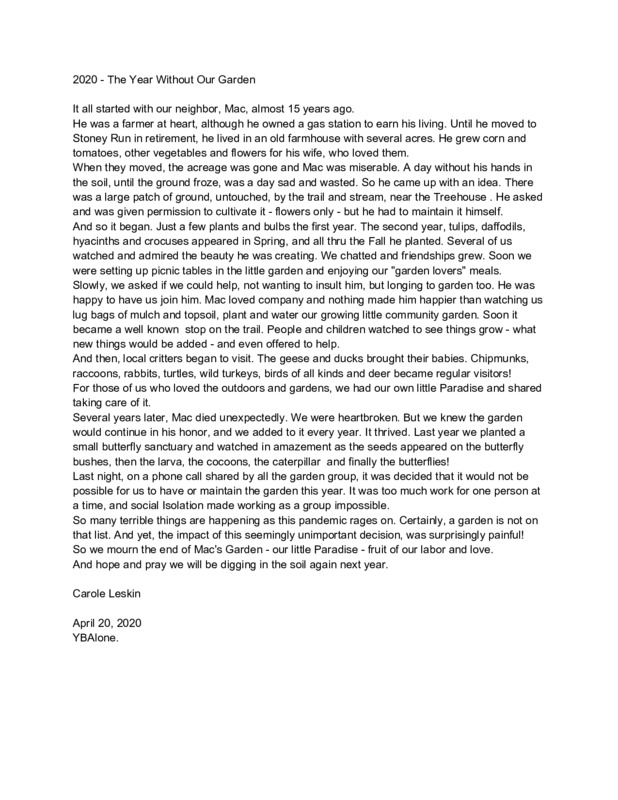
2020-04-12
I love to garden. And especially our community garden. We started small and watched it grow year by year. The friendships grew too. It was also a place where neighbor's walking their dogs or just out for a stroll could pause, admire the colors and aromas - a bit of peace in an increasingly stressful world. This year, restrictions governing social distancing and community gatherings prohibited us from working on our garden. The pandemic had taken yet another joy from our lives.
-
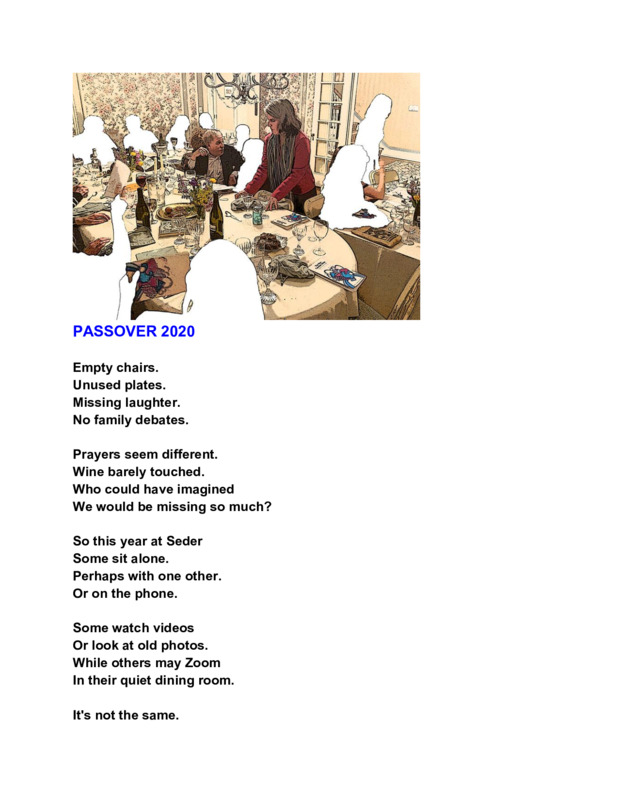
2020-04-12T16:15:10
Passover is one of my favorite holidays. I love the Seder, songs, prayers, food and sharing it with loved ones. For the last several years, I have been a guest at my dear friend's house. She has three grandson's, twins age 13 and a 10 year old. Her daughter is a wonderful baker and makes the most wonderful desserts! Her son is a chef and dinner is spectacular! He also conducts the Seder with the perfect combination of fun and the seriousness of the occasion. I miss this terribly!
-
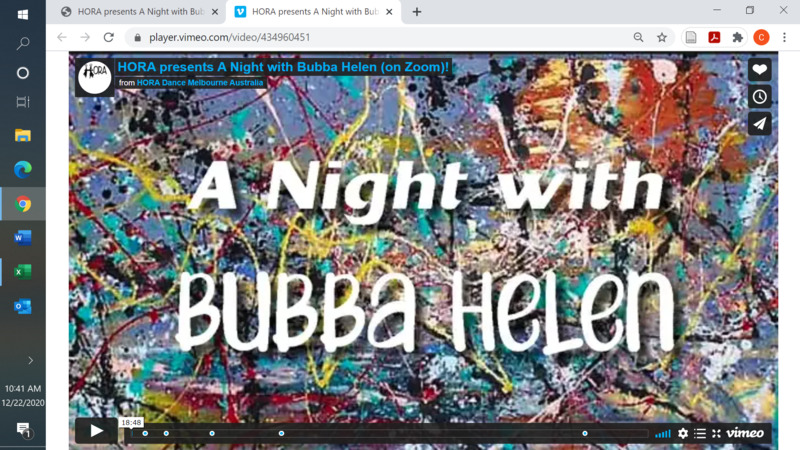
2020-06-29
The Israeli Folk dancing community in Melbourne specifically, is bereft at not being able to participate in weekly dance classes since the outbreak of the cholera pandemic
-
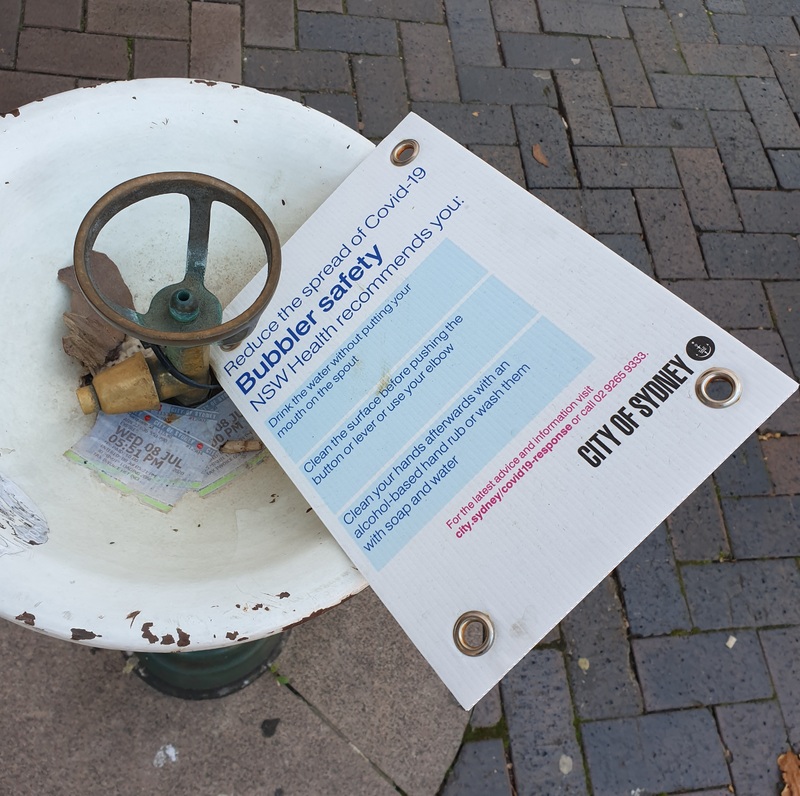
2020-07-20
A drinking fountain (bubbler) on Macquarie Street in the central business district of Sydney, New South Wales, Australia with government-issued safety instructions.
-
2020-07-17T23:12+10:00
Shortly after the coronavirus pandemic was announced I created and maintained a page on the Aleph Melbourne web site containing a list of resources catering to the Jewish and the LGBTIQ+ communities. I keep the page as current as possible.
-
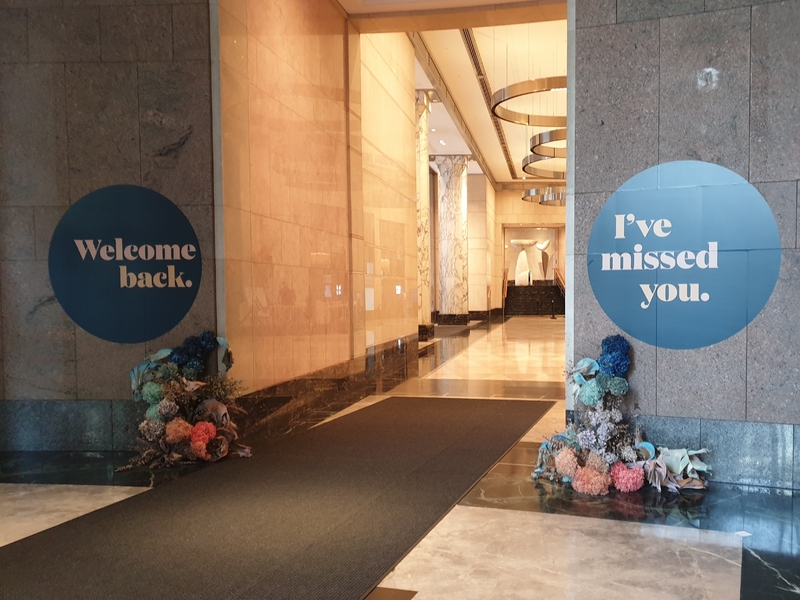
2020-07-16
This photograph indicates measures taken to celebrate the easing of pandemic-related restrictions on the gathering of people in commercial settings.
-
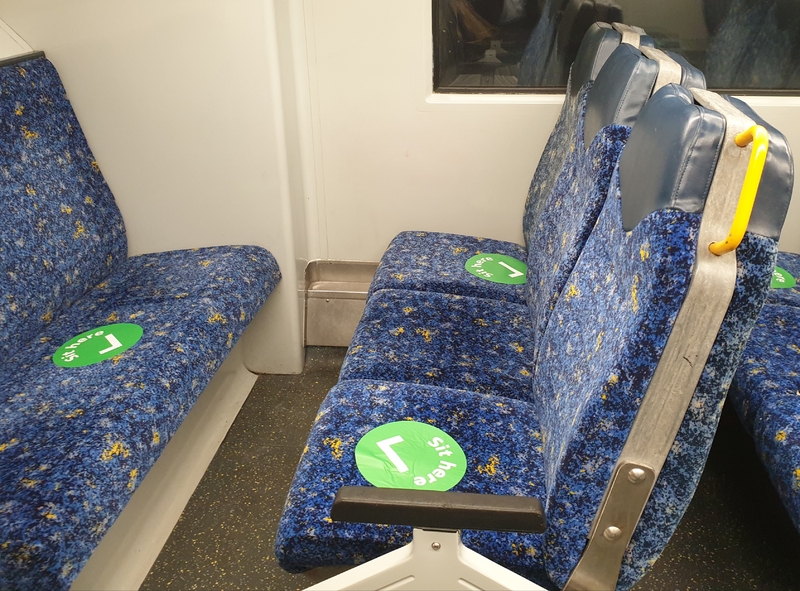
2020-07-02
A photograph demonstrating how public transport authorities have attempted to mitigate the risk of passengers contracting COVID-19.
-
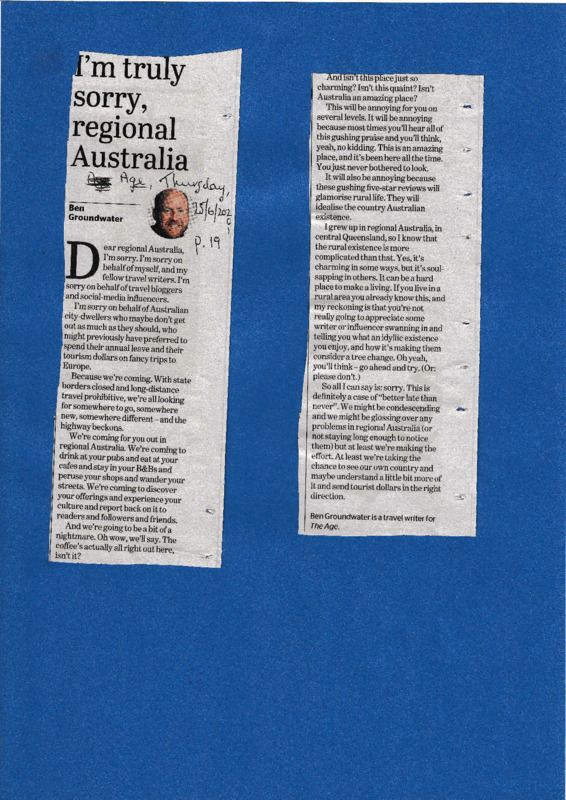
2020-06-25
This article talks of the metropolitan middle class and their 'invasion' of regional beauty spots - perforce, as they are not permitted to travel overseas currently.
-
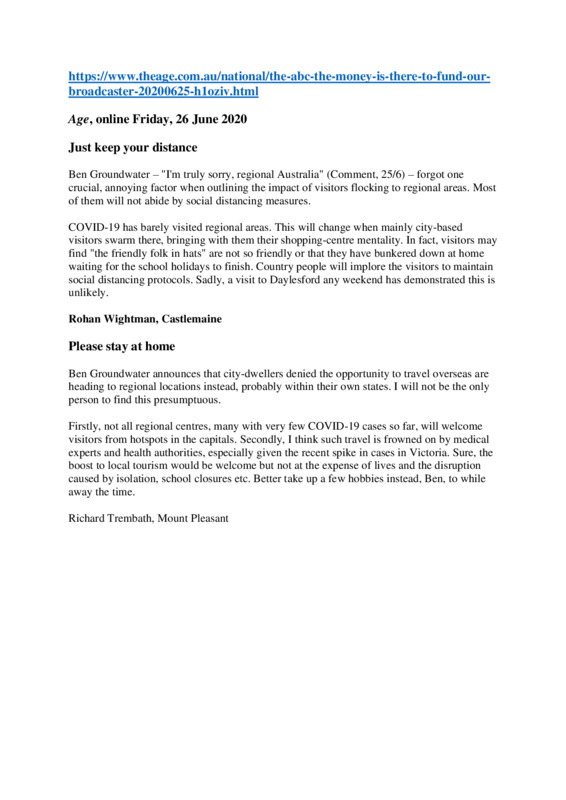
2020-06-26
I found the original article by Ben Groundwater extremely irritating and opposed to the balance of medical and state opinion. Just because the middle class are denied the opportunity currently to travel overseas does not mean they should be pounding off to regional centres which have largely been exempt from COVID-19.
-
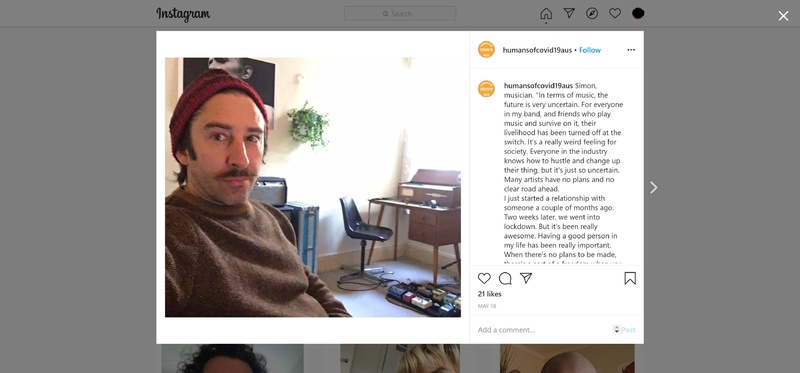
2020-05-18
“In terms of music, the future is very uncertain. For everyone in my band, and friends who play music and survive on it, their livelihood has been turned off at the switch. It's a really weird feeling for society. Everyone in the industry knows how to hustle and change up their thing, but it’s just so uncertain. Many artists have no plans and no clear road ahead.
I just started a relationship with someone a couple of months ago. Two weeks later, we went into lockdown. But it’s been really awesome. Having a good person in my life has been really important.
When there’s no plans to be made, there’s a sort of a freedom when you can just focus on the day. It is nice to make everything small like that - focusing on the 14-16 waking hours and not expecting too much out of them.
Simplicity has been getting me through this. The pot plants are getting a fair amount of attention...”
Instagram post on Simon, musician, and his experience during the pandemic, which was created by a psychology student living in Melbourne who was interested to hear about how COVID-19 was impacting on different peoples’ lives.
-
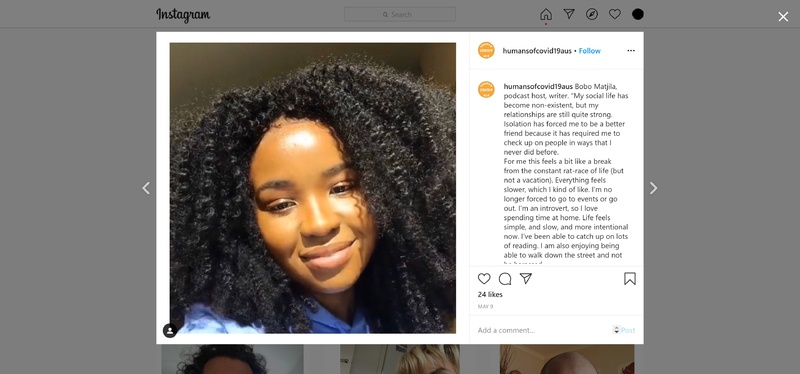
2020-05-09
“My social life has become non-existent, but my relationships are still quite strong. Isolation has forced me to be a better friend because it has required me to check up on people in ways that I never did before.
For me this feels a bit like a break from the constant rat-race of life (but not a vacation). Everything feels slower, which I kind of like. I’m no longer forced to go to events or go out. I'm an introvert, so I love spending time at home. Life feels simple, and slow, and more intentional now. I’ve been able to catch up on lots of reading. I am also enjoying being able to walk down the street and not be harassed.
I expected something like this to happen sooner or later. I always had the sense that the pace at which this city runs is not sustainable, so pretty soon it will collapse. I've been mentally and emotionally prepared for this to happen. Everyday people are dying, suffering, and in the depths of misery, which I feel is the norm of the human condition. Peace is the exception. I think that’s why I’m mentally not so affected by the pandemic, because I don't have hopeful expectations for humanity.
If we all agreed on the basics that homelessness and suffering is unnecessary, then we could get rid of all of this in a couple of months and save the future of humanity. There’s a lot we can do to prevent this, I just don't think we will do it.”
Instagram post on Bobo Matjila, podcast host & writer, and her experience during the pandemic, which was created by a psychology student living in Melbourne who was interested to hear about how COVID-19 was impacting on different peoples’ lives.
-
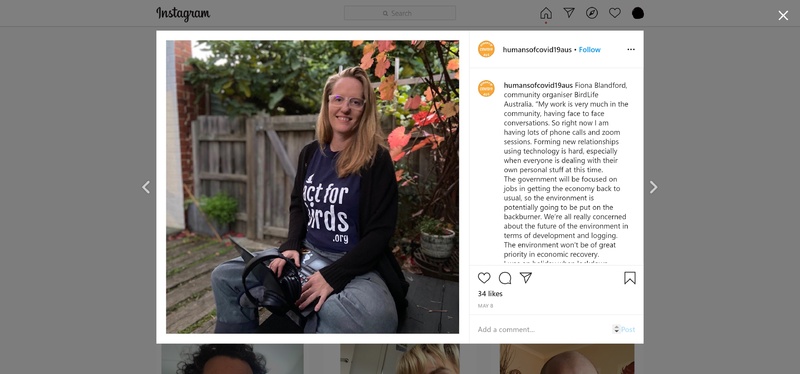
2020-05-08
“My work is very much in the community, having face to face conversations. So right now I am having lots of phone calls and zoom sessions. Forming new relationships using technology is hard, especially when everyone is dealing with their own personal stuff at this time.
The government will be focused on jobs in getting the economy back to usual, so the environment is potentially going to be put on the backburner. We’re all really concerned about the future of the environment in terms of development and logging. The environment won't be of great priority in economic recovery.
I was on holiday when lockdown started. Coming back to Melbourne was pretty shocking, and I was initially grieving the way things used to be. We’ve been doing lots of checking in with each other and touching base, which is really important but also exhausting. We were talking about Covid non-stop for 2-3 weeks. I'm getting better at not talking about it.
I feel lucky to have a home, a great relationship with my partner and a job. We need to remember to have gratitude whilst dealing with everything else going on.”
Instagram post on Fiona Blandford, community organizer of BirdLife Australia, and her experience during the pandemic, which was created by a psychology student living in Melbourne who was interested to hear about how COVID-19 was impacting on different peoples’ lives.
-
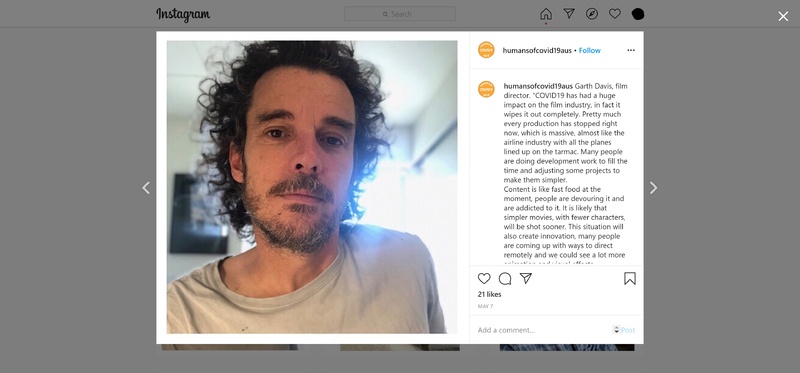
2020-05-07
“COVID19 has had a huge impact on the film industry, in fact it wipes it out completely. Pretty much every production has stopped right now, which is massive, almost like the airline industry with all the planes lined up on the tarmac. Many people are doing development work to fill the time and adjusting some projects to make them simpler.
Content is like fast food at the moment, people are devouring it and are addicted to it. It is likely that simpler movies, with fewer characters, will be shot sooner. This situation will also create innovation, many people are coming up with ways to direct remotely and we could see a lot more animation and visual effects.
For me, films are always ahead of reality. There are so many movies about COVID19 already, look at Contagion, almost bizarrely similar - it's crazy!
This event may inspire people to connect more to the story they are telling. Some of the greatest art has come from moments of trauma and difficulty. Sometimes such circumstances can push out really inventive, amazing things.
This virus is a dress rehearsal for what is really coming, one of the offspring of our journey to the elephant in the room, which is global warming. We do have the capacity to act as one people and work together globally. There is hope - but we need to get ahead of this, not be reactionary.”
Instagram post on Garth Davis, film director, and his experience during the pandemic, which was created by a psychology student living in Melbourne who was interested to hear about how COVID-19 was impacting on different peoples’ lives.
-
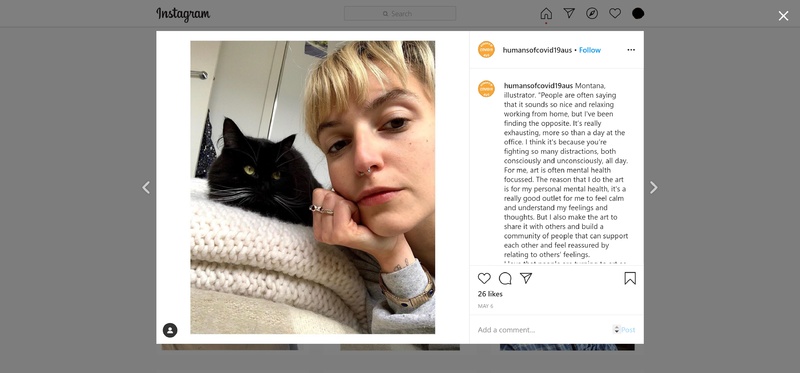
2020-05-06
“People are often saying that it sounds so nice and relaxing working from home, but I've been finding the opposite. It’s really exhausting, more so than a day at the office. I think it's because you’re fighting so many distractions, both consciously and unconsciously, all day.
For me, art is often mental health focused. The reason that I do the art is for my personal mental health, it's a really good outlet for me to feel calm and understand my feelings and thoughts. But I also make the art to share it with others and build a community of people that can support each other and feel reassured by relating to others’ feelings.
I love that people are turning to art as an outlet during this time. I'm a big believer that creativity can help people to reach a state of mindfulness and act as a preventative measure to mental health issues.
I’ve noticed that people are being so generous and compassionate. As I go for walks, I notice that people have got baskets out on the nature-strip, offering their things, and sending letters to each other. It’s really wholesome.
COVID19 has made me realize that there are so many things we do everyday that contribute to the decay of earth, but are completely unnecessary.”
Instagram post on Montana, illustrator, and her experience during the pandemic, which was created by a psychology student living in Melbourne who was interested to hear about how COVID-19 was impacting on different peoples’ lives.
-
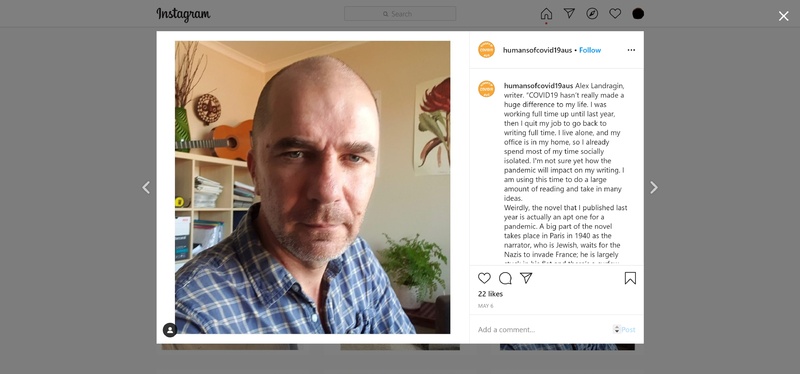
2020-05-06
“COVID19 hasn’t really made a huge difference to my life. I was working full time up until last year, then I quit my job to go back to writing full time. I live alone, and my office is in my home, so I already spend most of my time socially isolated. I'm not sure yet how the pandemic will impact on my writing. I am using this time to do a large amount of reading and take in many ideas.
Weirdly, the novel that I published last year is actually an apt one for a pandemic. A big part of the novel takes place in Paris in 1940 as the narrator, who is Jewish, waits for the Nazis to invade France; he is largely stuck in his flat and there’s a curfew going on. So in a way, my novel reflects the current reality.
Sometimes a silver lining doesn’t justify the damage caused by the thunderstorm. But I hope that this pandemic will lead to a recalibration of our priorities, away from a fantasy happiness bubble living beyond our needs. I hope the return to scarcity will be accompanied by a return to cooperation, mutual assistance, empathy. Some of those values that we associate with helping each other through tough times
I've been making a concerted effort to not rely too much on technology. I’ve made a deliberate decision to read more and I hope this quarantine will lead to a revival in interesting reading for all.
I've been reading a book that was written almost 100 years ago. The main message I've taken from the book is that you’re never going to get used to this. The only thing you can do is get used to not getting used to it.”
Instagram post on Alex Landragin, writer, and his experience during the pandemic, which was created by a psychology student living in Melbourne who was interested to hear about how COVID-19 was impacting on different peoples’ lives.
-
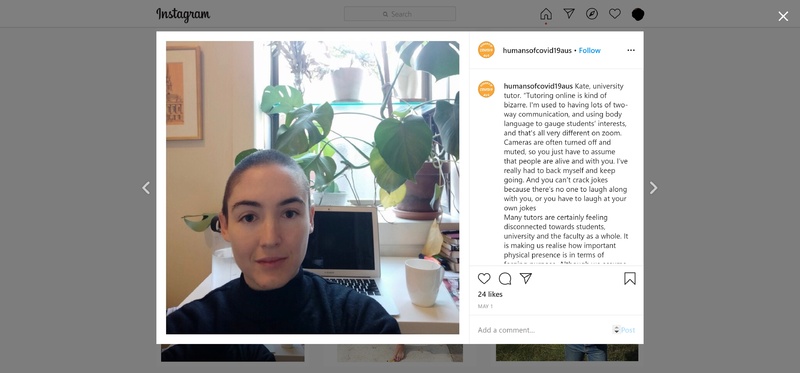
2020-05-01
“Tutoring online is kind of bizarre. I'm used to having lots of two-way communication, and using body language to gauge students’ interests, and that's all very different on zoom. Cameras are often turned off and muted, so you just have to assume that people are alive and with you. I’ve really had to back myself and keep going. And you can’t crack jokes because there’s no one to laugh along with you, or you have to laugh at your own jokes
Many tutors are certainly feeling disconnected towards students, university and the faculty as a whole. It is making us realise how important physical presence is in terms of forging purpose. Although we assume we are superior to the natural world, COVID19 is forcing people to realise the fragility of our systems. The shut down of certain supply chains has revealed how interconnected everything is.
It has also forced us to understand what we need to live, rather than what we want to live - it has made us all question what our actual basic necessities are versus our learned needs.
People's behaviour has become more environmental by accident. We just need to hope that there is not a slingshot back to old habits.”
Instagram post on Kate, university tutor, and her experience during the pandemic, which was created by a psychology student living in Melbourne who was interested to hear about how COVID-19 was impacting on different peoples’ lives.
-
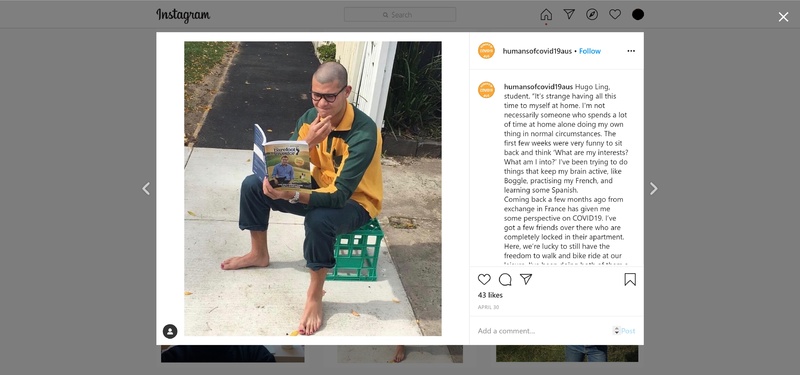
2020-04-30
“It’s strange having all this time to myself at home. I'm not necessarily someone who spends a lot of time at home alone doing my own thing in normal circumstances. The first few weeks were very funny to sit back and think ‘What are my interests? What am I into?’ I’ve been trying to do things that keep my brain active, like Boggle, practising my French, and learning some Spanish.
Coming back a few months ago from exchange in France has given me some perspective on COVID19. I’ve got a few friends over there who are completely locked in their apartment. Here, we’re lucky to still have the freedom to walk and bike ride at our leisure. I’ve been doing both of them a lot.
Earlier in the pandemic, everyone was talking about ‘social distancing’. My mum pointed out that the better term is ‘physical distancing’. You don't want to be socially distant, you want to be socially connected, with a distance - something that me and my friends have maintained.
I’ve been feeding off the creativity of some of my friends: weekly Zoom live music; a home-made magazine; a friend is making Vino Quarantino. So there are a few things that have been happening amongst my close circle that keep us all talking, interested and connected.
We’ll definitely carry the habit of diligent handwashing into the future, and a greater consideration for general hygiene. The pandemic has definitely sparked that in my house. I get bouts of cabin fever from time to time, but am trying to keep busy and active.”
Instagram post on Hugo Ling, student, and his experience during the pandemic, which was created by a psychology student living in Melbourne who was interested to hear about how COVID-19 was impacting on different peoples’ lives.
-
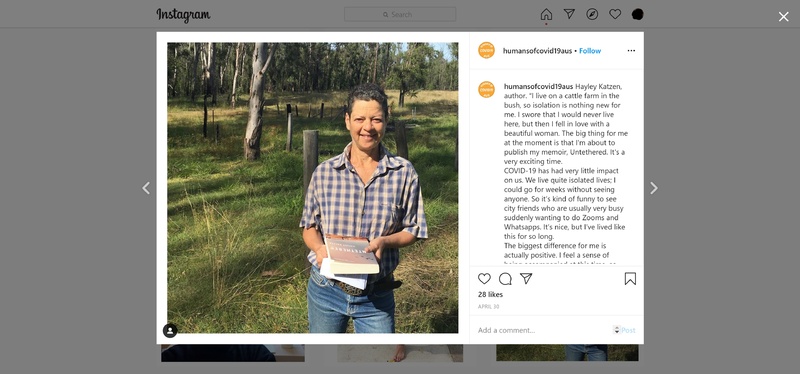
2020-04-30
“I live on a cattle farm in the bush, so isolation is nothing new for me. I swore that I would never live here, but then I fell in love with a beautiful woman. The big thing for me at the moment is that I'm about to publish my memoir, Untethered. It's a very exciting time.
COVID-19 has had very little impact on us. We live quite isolated lives; I could go for weeks without seeing anyone. So it’s kind of funny to see city friends who are usually very busy suddenly wanting to do Zooms and Whatsapps. It’s nice, but I’ve lived like this for so long.
The biggest difference for me is actually positive. I feel a sense of being accompanied at this time, as everyone is now living as I have been living. Often, over the years, I have felt quite lonely and struggled with the isolation, as do so many people. Now we are all in this. Adjusting to isolation is a deeply personal process. We all need to find what delights us and add it to our days.
As I have compromised immunity, I have to wear a mask when going out. It feels very strange going to the supermarket and not being able to connect with anyone. I’ve been dealing with ovarian cancer treatment, so there is an uncertainty to my future. At this time, when the whole world is dealing with anxiety and uncertainty, there’s a universality to this shared experience. I find this intriguing at one level, and also feel incredibly lucky to be where I am.
What most interests me is what we will put back into the world after this. My life won't change significantly. But in terms of our fragile planet, what will people do to take care of it?”
Instagram post on Hayley Katzen, author, and their experience during the pandemic, which was created by a psychology student living in Melbourne who was interested to hear about how COVID-19 was impacting on different peoples’ lives.
-
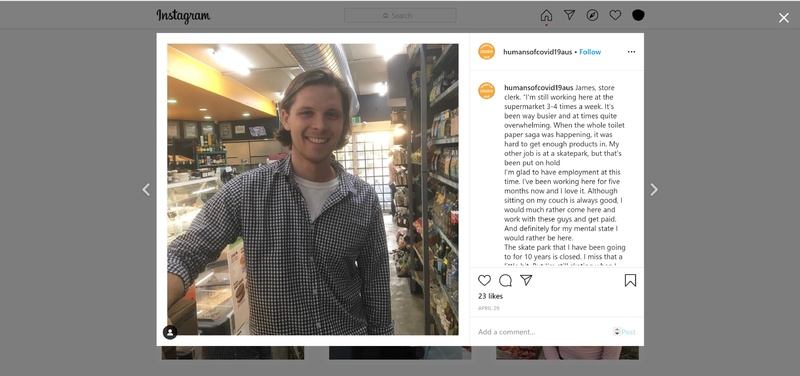
2020-04-29
“I'm still working here at the supermarket 3-4 times a week. It’s been way busier and at times quite overwhelming. When the whole toilet paper saga was happening, it was hard to get enough products in. My other job is at a skatepark, but that’s been put on hold
I'm glad to have employment at this time. I’ve been working here for five months now and I love it. Although sitting on my couch is always good, I would much rather come here and work with these guys and get paid. And definitely for my mental state I would rather be here.
The skate park that I have been going to for 10 years is closed. I miss that a little bit. But I’m still skating when I can.
I’m looking forward to being able to see my mates. Zoom calls are not the same. It’s weird, you never would have thought you’d appreciate it so much.”
Instagram post on James, store clerk, and his experience during the pandemic, which was created by a psychology student living in Melbourne who was interested to hear about how COVID-19 was impacting on different peoples’ lives.
-
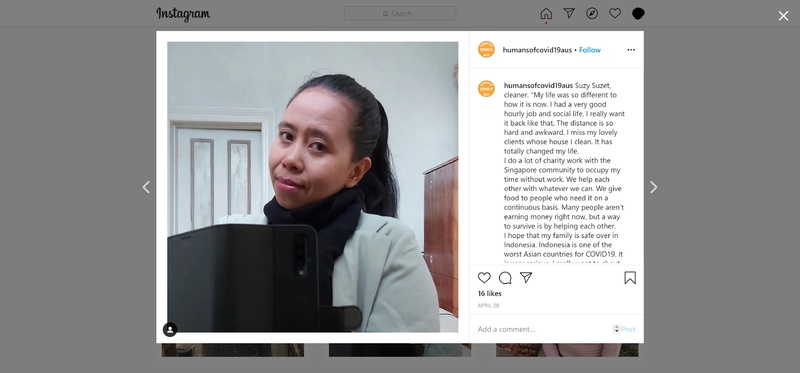
2020-04-28
“My life was so different to how it is now. I had a very good hourly job and social life. I really want it back like that. The distance is so hard and awkward. I miss my lovely clients whose house I clean. It has totally changed my life.
I do a lot of charity work with the Singapore community to occupy my time without work. We help each other with whatever we can. We give food to people who need it on a continuous basis. Many people aren’t earning money right now, but a way to survive is by helping each other.
I hope that my family is safe over in Indonesia. Indonesia is one of the worst Asian countries for COVID19. It is very serious. I really want to shout out to my people “this is the worst thing and listen to the government’s warnings!”. I always remind my family: stay at home. Don't worry about food or money, I will provide. Just don’t step outside the house.
I really appreciate the Australian Government, they are doing the best. The cases have slowed down, and there has been a good response and togetherness from all of the people. We must always be aware of what the government is saying. Always listen and do it, it’s not that hard. This is not a holiday, lock down is lock down. I have to go outside to make money. The rest are very lucky to work from home.”
Instagram post on Suzy Suzet, cleaner, and her experience during the pandemic, which was created by a psychology student living in Melbourne who was interested to hear about how COVID-19 was impacting on different peoples’ lives.
-
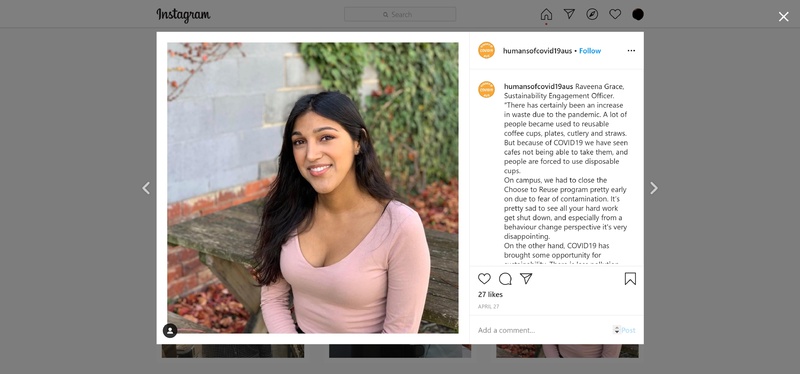
2020-04-27
“There has certainly been an increase in waste due to the pandemic. A lot of people became used to reusable coffee cups, plates, cutlery and straws. But because of COVID19 we have seen cafes not being able to take them, and people are forced to use disposable cups.
On campus, we had to close the Choose to Reuse program pretty early on due to fear of contamination. It’s pretty sad to see all your hard work get shut down, and especially from a behaviour change perspective it's very disappointing.
On the other hand, COVID19 has brought some opportunity for sustainability. There is less pollution on the roads; more people are beginning to see that they can work from home; and people are appreciating nature more.
There are many things people can do to improve their sustainability at home. For example, plants are really positive not only for health and wellbeing, but also for the environment and brightening the workspace.
Either people will gain a really strong appreciation for nature, and an awareness that we are not invincible. Or people will not connect the links between COVID-19 and the environment, and continue taking earth for granted. If we don't learn from our mistakes about how to be kind to the earth, we’re just going to face the same issues again.”
Instagram post on Raveena Grace, Sustainability Engagement Officer, and her experience during the pandemic, which was created by a psychology student living in Melbourne who was interested to hear about how COVID-19 was impacting on different peoples’ lives.
-
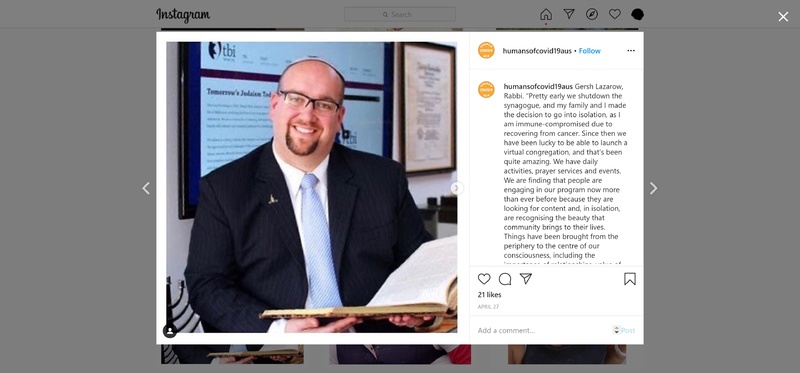
2020-04-27
“Pretty early we shutdown the synagogue, and my family and I made the decision to go into isolation, as I am immune-compromised due to recovering from cancer. Since then we have been lucky to be able to launch a virtual congregation, and that’s been quite amazing. We have daily activities, prayer services and events. We are finding that people are engaging in our program now more than ever before because they are looking for content and, in isolation, are recognising the beauty that community brings to their lives.
Things have been brought from the periphery to the centre of our consciousness, including the importance of relationships, value of community, sense of connectedness - many things that we take for granted until they are taken away.
As a rabbi, my tradition is a great source of comfort to me, inspiring me to find paths to continue, rather than to stop Jewish life, just as past leaders have done over our long 4,000 year history. The synagogue may be shut, but our community never closes. We accept the need for social distancing but reject any possibility for social isolation.
This year we added a paper clip to the Passover seder plate as a symbol of life right now. COVID-19 has required from us immense flexibility: the ability to bend and turn, but like the paper clip, the capacity to hold us together. The colour of the traditional paper clip, silver, is also symbolic, representing that even in this chaos there are silver linings, such as time, awakenings, valuable lessons, great blessings.”
Instagram post on Gersh Lazarow, Rabbi, and his experience during the pandemic, which was created by a psychology student living in Melbourne who was interested to hear about how COVID-19 was impacting on different peoples’ lives.
-
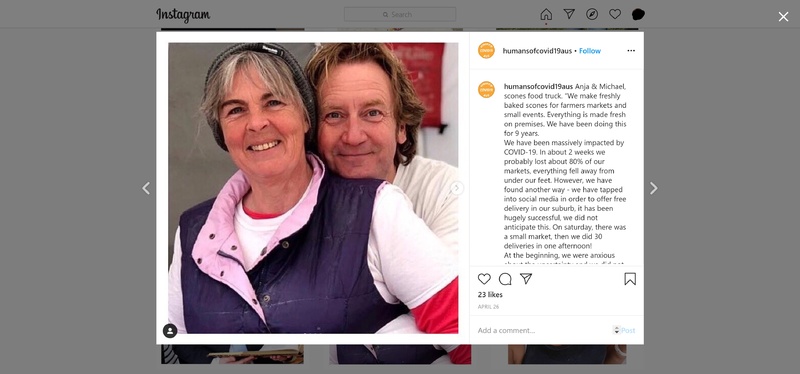
2020-04-26
“We make freshly baked scones for farmers markets and small events. Everything is made fresh on premises. We have been doing this for 9 years.
We have been massively impacted by COVID-19. In about 2 weeks we probably lost about 80% of our markets, everything fell away from under our feet. However, we have found another way - we have tapped into social media in order to offer free delivery in our suburb, it has been hugely successful, we did not anticipate this. On saturday, there was a small market, then we did 30 deliveries in one afternoon!
At the beginning, we were anxious about the uncertainty and we did not know if we could continue with the business at all. The uncertainty was the worst. Also the timeframe was challenging, we were supposed to be working at a market in the Dandenongs for 30 days continuously. But that was cancelled. So all our business calculations were thrown out.
All my family is in Germany, which is quite tough at the moment. There’s a lot that I'm missing out on. Sometimes life throws you curveballs, and you just have to deal with it.”
Instagram post on Anja & Michael, scones food truck, and their experience during the pandemic, which was created by a psychology student living in Melbourne who was interested to hear about how COVID-19 was impacting on different peoples’ lives.
 2020-05-04
2020-05-04 2020
2020 2020-04-23
2020-04-23 2020-04-20
2020-04-20 2020-08-19
2020-08-19 2020-04-08
2020-04-08 2020-04-01
2020-04-01 2020-03-01
2020-03-01 2020-03-01
2020-03-01 2020-04-01
2020-04-01 2020-07-14
2020-07-14 2020-08-10
2020-08-10 2020-08-11
2020-08-11 2020-07-30
2020-07-30 2020-03-16
2020-03-16 2020-04-05
2020-04-05 2020-02-28
2020-02-28 2020-04-07
2020-04-07 2020-06-09
2020-06-09 2020-04-03
2020-04-03 2018
2018 2020-04-12
2020-04-12 2020-04-12T16:15:10
2020-04-12T16:15:10 2020-06-29
2020-06-29 2020-07-20
2020-07-20 2020-07-16
2020-07-16 2020-07-02
2020-07-02 2020-06-25
2020-06-25 2020-06-26
2020-06-26 2020-05-18
2020-05-18 2020-05-09
2020-05-09 2020-05-08
2020-05-08 2020-05-07
2020-05-07 2020-05-06
2020-05-06 2020-05-06
2020-05-06 2020-05-01
2020-05-01 2020-04-30
2020-04-30 2020-04-30
2020-04-30 2020-04-29
2020-04-29 2020-04-28
2020-04-28 2020-04-27
2020-04-27 2020-04-27
2020-04-27 2020-04-26
2020-04-26